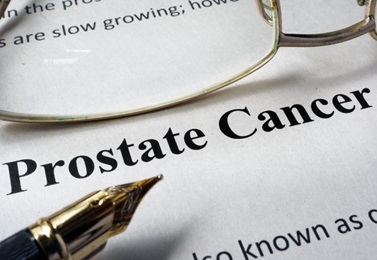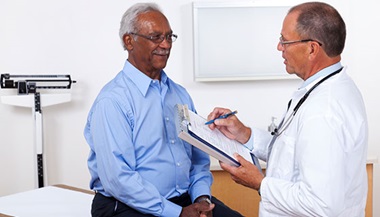Prostate Cancer Survivorship
The vast majority of prostate cancer cases are cured through treatment. However, for most men, the battle continues even after the cancer is gone. The months and years after treatment—known as the survivorship period—present a new set of challenges.
Coping Emotionally
Patients and their families will experience a wide range of emotions, from relief and hopefulness to anxiety and fear. Living with cancer means adjusting to a “new normal.” You may be more aware of how you feel and more dedicated to staying healthy. Relationships and sex may be different. Depending on your treatment, you will have short- or long-term side effects that impact several areas of your life.
Whenever possible, turn to family, friends, other men who have or had prostate cancer, and your medical team for support. Find an online or in-person community of survivors to rely on for advice and emotional support. Connecting with others through shared experiences will help you feel less alone and can be a valuable source of information and inspiration.
Diet and Prostate Cancer
After treatment, it’s important to maintain a healthy diet. While there’s no specific prostate cancer diet, eating well and maintaining a healthy weight will help you cope with side effects and lower your risk of developing other health conditions. Healthy eating may even reduce the risk of recurrence.
In general, you can follow the same guidelines on foods for prostate health that are recommended for prostate cancer prevention.
Sex After Prostate Cancer
There’s usually no reason to avoid sex after prostate cancer treatment. In fact, surgical patients should try to have an erection if they can. Staying in practice can help men regain and maintain their erectile function.
Nearly all patients experience some level of erectile dysfunction for the first few months following treatment. About half of men will return to pretreatment function within a year, if the nerves responsible for erections are still intact.
Managing the Side Effects of Prostate Cancer Treatment
All prostate cancer treatments have side effects. Some common side effects, which may cause long-term concern for patients, include the following:
Urinary Dysfunction
Urinary dysfunction is a fairly common side effect of prostate cancer surgery. It’s usually caused by damage to the nerves and muscles used for urinary control. Mild bladder leakage occurs in about 20 percent of men who have undergone a prostatectomy (surgical removal of the prostate). Some patients lose all urinary control following surgery.
Patients treated with radiation therapy are unlikely to experience leakage. However, they may be more likely to experience irritation that causes frequent urination, nocturia (excessive nighttime urination) or a sense of urinary urgency.
How to manage? For leaks or loss of bladder control, use an incontinence pad and wear dark pants. For more severe urinary dysfunction that isn’t improving, your doctor may recommend a surgical procedure to insert a sling or artificial urinary sphincter for more long-term relief.
Irritative urinary symptoms caused by radiation are often treated with drugs for a few weeks until symptoms improve.
Bowel Dysfunction
Though less common, bowel issues, such as rectal bleeding, diarrhea or urinary urgency, can be side effects of radiation for prostate cancer, due to the proximity of the prostate to the rectum.
How to manage? There isn’t much that can be done about bowel dysfunction, other than treating symptoms with dietary changes (e.g., increasing fiber intake) or antidiarrheal medication. Severe bleeding, which is very rare, may require electrosurgical treatment.
Erectile Dysfunction
Most men will experience some erectile dysfunction, especially immediately after treatment. However, many men regain function over time. How much is regained depends on your potency before treatment and the type of treatment used. Surgery and hormone therapy impact erectile function more so than radiation therapy, but radiation may increase the likelihood of dysfunction over time. For many men, the loss of libido caused by hormone therapy resolves after therapy is complete.
How to manage? Your doctor can discuss your options, including oral medications for erectile dysfunction, mechanical vacuum devices and surgical treatments.
Infertility
It is nearly impossible for a man to retain his ability to father children through sexual intercourse after initial treatment. During prostatectomy, the seminal vesicles and prostate are both removed, making ejaculation impossible and preventing sperm from leaving the body. Radiation almost always impairs fertility because it affects the semen’s ability to transport sperm.
How to manage? If you are hoping to have children, discuss your desire with your care team before treatment. Sperm banking may be your best option. A fertility specialist can also provide advice about extracting sperm from the testicles for use with in vitro fertilization.
Second Cancers After Prostate Cancer
It’s normal to be concerned about getting cancer again. While screening for prostate cancer recurrence is an important part of survivorship, keep in mind that you could develop another type of cancer. In fact, once you’re had prostate cancer, your risk of developing certain cancers may even be elevated.
According to the American Cancer Society, men who have had prostate cancer may be more likely to develop bladder cancer, soft tissue sarcoma, small intestine cancer, thyroid cancer, thymus cancer and melanoma. Additionally, radiation therapy itself may increase your risk of developing rectal cancer and acute myeloid leukemia (AML).
It’s important to continue regular checkups after cancer treatment and report any new symptoms to your doctor. Take steps to lower your cancer risk and improve your overall health by focusing on a low-fat, plant-heavy diet. Maintain a healthy weight, get plenty of exercise, limit your alcohol consumption and avoid all tobacco products.
Active Surveillance Survivorship Concerns
Patients with slow-growing prostate cancer may choose active surveillance, delaying treatment until symptoms or test results indicate progressive disease.
Learn more about this option—and how to manage the unique concerns that accompany active surveillance.





